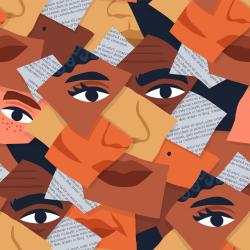
Who should tell stories about conflict? An easier question is: who can tell stories about conflict?
‘The answer today, like never before, is absolutely everyone,’ says David Tuck, Australian head of the International Committee of the Red Cross, or ICRC. ‘The record of war is no longer handwritten letters, faithfully preserved by the ICRC’s Central Tracing Agency in a vault somewhere in Geneva, but masses of data across thousands of platforms. Suddenly, and fortunately, people can be the masters of their own stories ... they are exposing crimes and demanding redress.’
Tuck was speaking at an in-person event at UTS, ‘Who should tell stories about conflict?’, part of an ongoing partnership between the ICRC and the CMT. The timing could not have been more apt. The event was held on August 19, which marked: World Humanitarian Day; Afghanistan’s Independence Day; and almost exactly one year since the Taliban retook Afghanistan.
‘But for all the positives, there are challenges too,’ Tuck continued. ‘Dis- and mis-information have always been core business in war but today the scale and the reach are unprecedented. In 2022, it’s not actually clear that all of those who are telling the stories of war are human. At best, the real picture, the true story, is increasingly difficult to discern. At worst, propaganda and hate speech, peddled by bots, risk inflaming tensions, causing further death, injury and destruction.’
After Tuck’s introduction, a panel discussion featured The Sun Herald’s Anthony Galloway and the ABC’s Yaara Bou Melham, who have reported from the most challenging of conflict zones. Expert legal input came from UTS Law’s Kathryn Greenman. Also on the panel was Marwa Moeen, who managed an unlikely escape from Kabul after the Taliban took control, helping 15 other young women escape too. Marwa has told her story for the ABC and in the documentary Die. Or Die Trying.
As Marwa says, her liberty owes a great deal to the journalists (and activists) who adopted her cause. And that’s changed her life. In Kabul, Marwa had been studying business. In Australia, she will start studying a journalism degree next year at UTS, funded by a CMT/ MDA scholarship. Her aim is to become a professional journalist, and to be one of those exposing crimes and demanding redress.
After the event, Marwa chatted with the other panellists, and quietly shed a tear. If anyone should be telling stories about conflict, it’s her, but that doesn’t mean it’s easy.

Sacha Molitorisz, Senior Lecturer - UTS Law
This article was featured in our newsletter of 2 September 2022, read it in full here.
To subscribe and stay up to date with all things Centre for Media Transition, click here.

